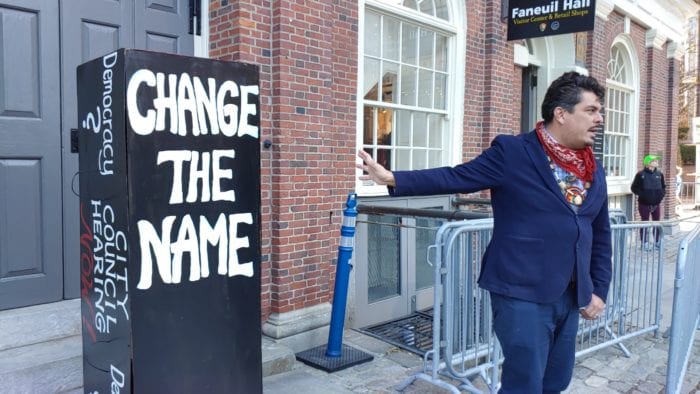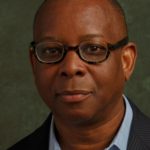
It represents the ugly canard that Peter Faneuil was somehow a patriot.
There is a distinct reason why we all should hate what now stands as Faneuil Hall.
The downtown Boston icon has stood in our city since before our nation was founded. According to Travel & Leisure magazine, Faneuil Hall is among the most visited tourist venues in the world. It is a civic location where important issues of abolitionism and women’s rights were debated.
Despite these auspicious facts, many across the world don’t know that Faneuil Hall has its roots in the transatlantic slave trade. It was given to the City of Boston by Peter Faneuil, a slave owner who prospered financially from selling and buying African people. Peter Faneuil owned slaves in Boston where he lived on Beacon Hill. Upon his death at 42, Faneuil gave five slaves to his family members, further revealing his commitment to the idea that Black people were less than human.
We should never hate each other as humans. But we can commit ourselves to hate realities that reflect disdain for others, particularly Blacks in our city. For this reason, we hate Faneuil Hall as it is presently named—not because of its connection to much that has happened on the site that relates to the evolution of American Democracy, but because the name symbolizes white supremacy. It represents the ugly canard that Peter Faneuil was somehow a patriot. It represents a legacy of hatred wherein a race of people in Boston were reduced to the status of talking work animals. We hate the name. We love the building that reflects the legacy of an otherwise great city.
A recent poll conducted by the MassInc Polling group confirms our reasons for changing the name of Faneuil Hall. According to the poll of likely voters in Boston, 51% of all Bostonians feel that we should change the name because of its association with slavery. Nearly 70% of Black Bostonians feel supportive of striking Peter Faneuil’s name from the building. More than 90% of Bostonians feel that there should be more Black-owned business at the Faneuil Hall Quincy MarketPlace, once a site of a slave auction block where Black people were sold.
All across the nation, cities, municipalities, and states are removing symbols of racism that mischaracterize the humanity of Black people. They are removing Confederate statues and renaming streets and schools. Universities such as Harvard and Princeton are addressing the roots of slavey that are connected to their early beginnings of centers of higher education. Recently, the state of Mississippi removed a symbol of ant-Black racism from its state flag. This was a stunning advancement related to our continuing efforts to address racism.
Members of Occupy Boston recently joined members of the New Democracy Coalition at Faneuil Hall to continue the call for the name change. Patrick Wilson, a leader of Occupy Boston, was clear in making the connection between economic inequality and the disproportionately suffering experienced by Black Bostonians, who are comparably poorer, less safe, and most vulnerable to the pernicious impacts of gentrification in our city. We appreciate the support of Occupy Boston as a force in the city that highlights the social evil reflected in Boston racism.
Our call for a Faneuil Hall name change is grounded in a commitment to address the larger issues of anti-Black racism that is articulated in the various forms of systemic oppression fostered upon the city’s Blacks. Our call is not simply symbolic—it calls for the total transformation of the City of Boston. It calls for leveling the civic playing field. It calls for justice that is reflected in change within city housing, public education, public safety and healthcare.
This much is true: We would not celebrate a building named Hitler Hall; we would not celebrate Mussolini Hall. As such, we must all pledge our hate for the name Faneuil Hall and move toward remaking Boston as a place where Blacks can survive and flourish.
Kevin C. Peterson is founder of the New Democracy Coalition and the Faneuil Hall Race and Reconciliation Project. He lives in the Meeting House Hill section of Dorchester in Boston.

